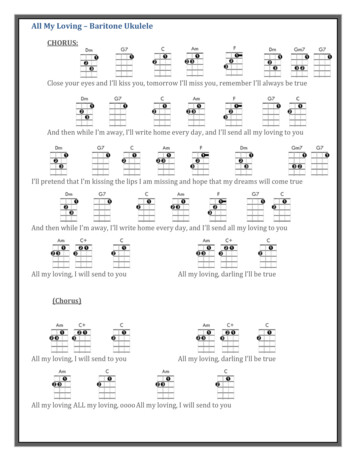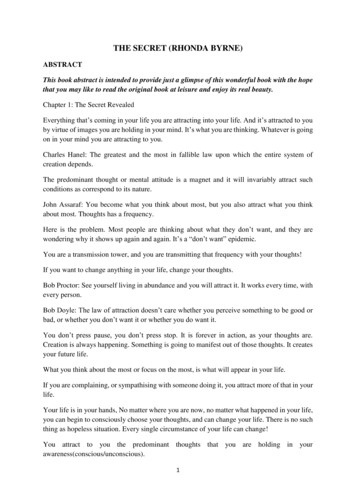
Transcription
OF TEENAGERSThe Secret to Loving Teens EffectivelyGary ChapmanNORTHFIELD PUBLISHINGCHICAGO
IF YOUR TEENAGER’S LOVE LANGUAGE ISW O R D S O F A F F I R M AT I O N :Pick and choose among the following ideas to try somethingnew you think your teenager will appreciate.· Talk about a goal your teenager would like to reach andverbally encourage them to explore it.· Put a sticky note with some encouraging words on the cerealbox they will see in the morning.· Make a habit of mentioning something specific you’veobserved that highlights your teenager’s accomplishments.Examples include, “I really enjoyed the way you picked upyour clothes without my asking you,” or “I appreciate thatyou worked so hard to finish your paper for school on time.”· Ask what your teenager wants to do after high school. Ifyour daughter says, “I want to work as a physical therapist,helping people recover from difficult injuries,” verballyencourage her to find what would be involved in reachingthis goal.· Copy or cut out inspirational quotes as you find them inpublications and simply attach a note that says, “This reallyreminded me of you.”· If you are artistic, create a painting or drawing that showshow much you love your teenager.· Take a favorite piece of artwork or special note from yourteenager to be professionally framed. Then hang it in yourhome or office.· When you have to be out of town for work or other reasons,leave a series of short notes for your teenager, one for eachday you are apart.
· Text your teenager whenever you think of them just to say, “Ilove you.”· Place their trophies, best school papers, and other standoutworks in areas they recognize as important to you such asthe refrigerator, the office, or a special scrapbook.· When your teenager is feeling down, share five reasons whyyou are proud of them.· Keep a picture keychain (or pictures on your phone) withcurrent pictures of your teenager and talk about them withyour friends—especially when your teenager is around.· Create an encouragement jar that you and your teenagercan use to drop in notes of praise and read together on aregular basis.· When a teenager makes a mistake trying to do somethinghelpful, first use words to recognize that you knew of theirgood intentions.
IF YOUR TEENAGER’S LOVE LANGUAGE ISPHYSICAL TOUCH:Need more ideas? Try one or more of these with your teenagerthis week.· Hold hands during family prayers.· Develop a unique handshake or greeting that is only usedbetween you and your teenager. Use it regularly when you saygoodbye or meet after being apart.· If your teenager is under stress, gently stroke their headto relax them as your son or daughter tells you about theirsituation.· Hug and kiss your teenager every day when they leave forschool for as long as they will let you, but be sensitive to theirresistance, especially when in public.· Shortly after disciplining your teenager, take a moment to givethem a hug to show them the discipline was a consequence oftheir wrong choice and not against them as a person.· Give each other a high five or similar congratulations wheneveryou catch your teenager doing something positive.· Purchase a gift for your teenager that is touch oriented, such asa soft pillow, blanket, or sweater.· Play games or sports together that require physical touch. Thiswill allow both shared time together as well as touch that ismeaningful without appearing forced.· Offer to give your teenager a shoulder massage when theyexperience an especially difficult day.· For father and son, playful wrestling can often express love, butonly if this is an activity enjoyed by the teenager.
· Provide a positive “pat on the back” as a way of communicatinglove when your teenager accomplishes something significant.(This can also often be helpful when your teenager has notaccomplished a goal. Strive to be unconditional in offering love.)· If you see your teenager already in bed, walk in and pull theirblankets up around them.
IF YOUR TEENAGER’S LOVE LANGUAGE ISQUALITY TIME:The biggest commitment in showing love to a teenager desiring quality time is a commitment to change your personalschedule. Sometimes talking together in the car after schoolor practice to discuss the day is all that is needed, but here areseveral more creative ideas for your times together.· Ask very specific questions about your teenager’s day thatrequire more than a “yes” or “no” answer.· Stop what you are doing to make eye contact with your teenageras they tell you something important.· Have your teenager record special events on her phone. Thenwatch the video together to see what memories she captured.· Have your teenager tell you of places they would like to go andwhy. Then surprise them occasionally by letting them chooseone or arranging it for them ahead of time.· Turn off your television show to watch your teenager’s favoriteshow with them.· If your teenager is driving, take a road trip together to a locationof their choosing.· Cook something together for a snack—such as cookies orbrownies.· Find silly things to laugh about and laugh about them a lot.· Make a snack for yourself when you make one for yourteenager. Then talk about their day together as you eat.· If you have more than one child, arrange for care of the othersand take your teenager out for a quick breakfast before school
or for a smoothie after school.· Go a few minutes early to pick up your teenager from hockeypractice or Student Council. Stay late talking together about hisinvolvement and get to know others involved in the group or onthe team, such as teammates, coaches, or teachers. Tell thecoach or teacher you appreciate his hard work.· If your family is musically talented, sing or play instrumentstogether at home instead of watching television. Even better,choose a specific time each week and make it a tradition.· Keep your scheduled times with your teenager on your deviceand make those dates high priority.· Surprise your teenager with tickets or a trip to a specialplace. A camping trip, basketball game, or trip to the mall canbuild lifelong memories. Take pictures of the event to furtherstrengthen this surprise.· If possible, take your teenager to your workplace one day.Introduce your teenager to your coworkers, include them inyour meetings, and talk about what it’s like to serve in yourparticular company.· Create “traditions” with your teenager, such as eating icecream at the same store each time or walking together at aparticular park.· Choose one or two board games or card games that youregularly play together.· Focus family vacations to include significant time beingtogether versus a trip focused on divided parent and teenageractivities.· Occasionally take family walks or bike rides together. Seekopportunities to spend time together that also include exercise.
· Share more meals together as a family at the table. Makedinnertime a special occasion with lots of pleasant talk aboutthe day. Family prayer can also strengthen this practice.· Don’t give up “tucking in” your teenager at night. You may nolonger read bedtime stories, but you can still talk about the dayor pray together.· Spend time doing homework together. This both improves theirgrades and creates additional quality time (you might also learnsomething new).· Plant something together. For those with outdoor-orientedteenagers, time together in a flower garden, planting summervegetables, or landscaping the yard can create lifelong positivememories.· Make photo albums or a scrapbook together—either in a bookor on your computer. Talk together about the memories youshared in the process.
IF YOUR TEENAGER’S LOVE LANGUAGE ISACTS OF SERVICE:While this chapter discusses the need to train your teenagerto grow and to serve others, there are many times when asimple act of service to your teenager provides significantimpact. Here are several that express love without ignoringyour teenager’s need for responsibility.· Acknowledge your teenager’s uniqueness by shopping togetherfor new paint colors for their room and helping them paint it.· Help your teenager practice for their sports team, such aspitch and catch for baseball, or help rebounding free throws forteenagers participating in basketball.· Assist your teenager on a tough homework assignment.· Make a favorite snack when your teenager is having a difficult day.· Do a chore that usually is your teen’s responsibility when they’reespecially loaded with homework or have tests coming up.· Occasionally wake up a half-hour earlier to make a specialsurprise breakfast for your teenager. (Make sure she has time!)· Begin teaching your teenager the importance of serving othersthrough regular involvement in a local community group orchurch ministry. For the independent teenager, allow them toresearch different opportunities and select the place of service.· When running late for school or other meeting, help yourteenager quickly finish what needs to be done so they canarrive on time.· During a time when your teenager is sick, go the extra step bysetting up their favorite movie or making their favorite soup.
· Connect your teenager with one of your friends or family members who can help them in an area of interest such as dancelessons, soccer, or piano playing.· Choose one special area in which you determine to alwaysserve your teenager above and beyond normal expectations.Examples could include making sure school lunch is alwaysmade or making a favorite dessert on a regular basis.· Start a “birthday dinner” tradition where you make your teenager any meal they want on their birthday.· Help your teenager create flash cards for their upcoming testor quiz. Work together with your teenager until they feel confident with the material.· If your teenager calls you at work and is in a crisis, sacrificemore time than usual to listen to their situation.
IF YOUR TEENAGER’S LOVE LANGUAGE ISGIFTS:When it comes to gift giving, many parents need to bereminded that the gift is as much about the love behind thegiving as it is about the gift itself. Creativity is more importantthan money when it comes to gift giving for your teenager.· Select presents that fit the interests of your teenager—choosinggifts that are perceived as appropriate by your teenager.· When on a shopping trip, give your teenager a set “allowance”that you will pay toward an item they select.· Keep a small collection of inexpensive gifts packed away foryour teenager. Then give them one at a time as you sense thereis a need.· Carry candy or gum you can give away as a small gift whenaway from home.· Make a special meal you know your teenager likes, go to aspecial restaurant, or make their favorite dessert.· Start a collection of unique gift boxes and wrapping papers thatcan be used to package even the most simple of presents.· When away from home, mail a small package to your teenagerwith their name on it in large letters.· Keep a “gift bag” of small, inexpensive gifts your teenager canchoose from as a reward for doing something positive. Thesegifts can also include “coupons” for special privileges, likeallowing three friends to stay over that weekend or choosingwhere the family eats the next time you go out.· Give your teenager a “song,” either one you make up or a specialsong you select that reminds you of them.
· Create a scavenger hunt for a gift that includes a map and cluesalong the way to the main surprise.· Hide a small gift in your teenager’s coat pocket with an encouraging note attached.· If you are away from your teenager a few days, leave a smallpackage for each day with a special gift and note reminding howmuch you love them.· Instead of spending money on a larger gift for a birthday, hosta large birthday party with their friends, encouraging eachperson to bring a gift or card.· Consider a gift that lasts, such as a tree you can plant together,a board game you can play together in the future, or a picturethey can hang in their room.· Buy a ring or necklace for your teenager to wear that is justfrom you.· For a birthday or Christmas, shop together for a special gift thatincludes your teenager’s opinion in the process. This specialgift plus personal involvement in the decision can create ahighly meaningful gift.· During the Christmas holiday season, shop together to purchase a gift for someone in need, partnering with Angel Tree,The Salvation Army, or a similar organization.· Give hints leading toward a special upcoming gift. A “countdown” of notes such as, “Only four more days until present day,”help create huge anticipation and a tremendous amount of lovefor those who especially enjoy receiving gifts.· Send flowers or candy to be delivered at school with a note thatrecognizes an academic or extracurricular achievement.
NotesChapter 1: Understanding Today’s Teenagers1. YOUTHviews 6, no. 8 (April 1997): 3; published by the George H. GallupInternational Institute, Princeton, NJ.2. 1 Samuel 3:10 niv.3. YOUTHviews 6, no. 7 (March 1999): 3.4. James Garbarino, Lost Boys: Why Our Sons Turn Violent and How We Can Save Them(New York: Free Press, 1999), 6–7.5. YOUTHviews 5, no. 9 (May 1998): 2.6. Jerrold K. Footlick, “What Happened to the American Family?” Newsweek (SpecialEdition), Winter/Spring, 1990, 15.7. Eric Miller with Mary Porter, In the Shadow of the Baby Boom (New York: EPMCommunications, 1994), 5.8. Richard Louv, Childhood’s Future (New York: Anchor, 1990), 6.9. Christian Smith and Melinda Lundquist Denton, Soul Searching: The Religious andSpiritual Lives of American Teenagers (New York: Oxford University Press, 2005), 40.10. Ibid., 31, 40, 45.11. Ibid., 37.12. YOUTHviews 5, no. 1 (September 1997): 1.
294 THE 5 LOVE LANGUAGES OF TEENAGERSChapter 2: The Key: Love from Parents1. YOUTHviews 5, no. 8 (April 1998): 1; published by the George H. GallupInternational Institute, Princeton, NJ.2. YOUTHviews 5, no. 9 (May 1998): 2.3. YOUTHviews 6, no. 8 (April 1999): 3.4. YOUTHviews 5, no. 7 (March 1998): 2.5. YOUTHviews 5, no. 6 (February 1998): 5.6. Lawrence Steinberg and Ann Levine, You and Your Adolescent (New York: Harper,1997), 2.7. YOUTHviews 5, no. 2 (October 1997): 1, 4.8. James Garbarino, Lost Boys: Why Our Sons Turn Violent and How We Can Save Them(New York: Free Press, 1999), 50.9. Ibid., 51.10. Ephesians 1:6 nkjv.11. Ken Canfield, The Heart of a Father (Chicago: Northfield, 2006), 225.12. Garbarino, Lost Boys, 158.13. Those who struggle with unresolved anger may profit from reading GaryChapman, Anger: Handling a Powerful Emotion in a Healthy Way (Chicago:Northfield, 2015).14. Garbarino, Lost Boys, 138.15. Daniel Goleman, Emotional Intelligence (New York: Bantam, 2006), 20–30.16. David Popenoe, Life Without Father (New York: Free Press, 1996), 191; HenryCloud and John Townsend, Boundaries with Kids (Grand Rapids: Zondervan,1998), 46; and Garbarino, Lost Boys, 154.17. Matthew 22:35–40 niv.18. Garbarino, Lost Boys, 168.19. Ibid., 132.Chapter 3: Love Language #1: Words of Affirmation1. Proverbs 18:21 nkjv.2. Anne Cassidy, “Fifteen Ways to Say ‘I Love You,’” Woman’s Day, February 18, 1997, 24.Chapter 4: Love Language #2: Physical Touch1. Ecclesiastes 3:1, 5 niv.2. For practical help on anger management, see Gary Chapman, Anger: Handling aPowerful Emotion in a Healthy Way (Chicago: Northfield, 2007).3. YOUTHviews 6, no. 8 (April 1999): 1; published by the George H. GallupInternational Institute, Princeton, NJ.
Not e s 295Chapter 5: Love Language #3: Quality Time1. Ross Campbell, How to Really Love Your Teen (Colorado Springs: Cook, 2004), 33.2. Gary Smalley and Greg Smalley, Bound by Honor (Wheaton, IL: Tyndale, 1998), 98.3. Eastwood Atwater, Adolescence (Englewood Cliffs, NJ: Prentice Hall, 1996), 198.4. Ibid., 201.5. Smalley and Smalley, Bound by Honor, 107.6. Lawrence Steinberg and Ann Levine, You and Your Adolescent (New York: Harper,1997), 13.Chapter 6: Love Language #4: Acts of Service1. Matthew 20:28 niv.2. Matthew 20:26 niv.Chapter 9: Anger and Teenagers1. Counting to one hundred, five hundred, or even one thousand can be an effectivemeans of restraining an immediate and uncontrolled anger response. For suggestions on how this can work, see Gary Chapman, Anger: Taming a Powerful Emotion(Chicago: Moody, 2015), 38–40.Chapter 10: Loving Your Teen in Single-Parent and Blended Families1. Proverbs 29:18 kjv.2. Shmuel Shulman and Inge Seiffge-Krenke, Fathers and Adolescents (New York:Routledge, 1997), 97.3. Tom and Adrienne Frydenger, The Blended Family (Old Tappan, NJ: Revell, 1984), 19.4. Shulman and Seiffge-Krenke, Fathers and Adolescents, 123; Frydenger, The BlendedFamily, 120.5. Lawrence Steinburg and Ann Levine, You and Your Adolescent (New York: Harper,1997), 13.Chapter 11: Love and the Desire for Independence1. Lawrence Steinberg and Ann Levine, You and Your Adolescent (New York: Harper,1997), 150.2. George Sweeting, Who Said That? (Chicago: Moody, 1995), 302.3. Ibid., 370.4. Lawrence Kutner, Making Sense of Your Teenager (New York: William Morrow,1997), 44.Chapter 12: Love and the Need for Responsibility1. Lawrence Steinberg and Ann Levine, You and Your Adolescent (New York: Harper,1997), 16.2. Ibid.
296 THE 5 LOVE LANGUAGES OF TEENAGERS3. Ibid., 16–17.4. Ibid., 16.5. See Exodus 20.6. The two commandments Jesus said were the greatest were to love God with yourwhole heart and to love your neighbor as you love yourself; see Mark 12:30–31.7. Steinberg and Levine, You and Your Adolescent, 187.Chapter 13: Loving When Your Teen Fails1. John Rosemond, Teen-Proofing: A Revolutionary Approach to Fostering ResponsibleDecision Making in Your Teenager (Kansas City, MO: Andrews McMeel Publishing,1998), 170.2. To find a local chapter of Al-Anon, visit their website at: www.al-anon.org.
The 5 Love LanguagesTest for TeenagersINSTRUCTIONS:Your parents have read The 5 Love Languages for Teenagers and arewondering if they are speaking your love language. If they haven’talready explained it to you, your primary “love language” is basicallyone of the following: words, touch, quality time, gifts, or service. Youknow your parents love you because they most often express theirlove to you through one of these “love languages.”You’re going to see thirty pairs of things that your parents mightdo or say to show love to you. All you have to do is pick one item ineach pair that you like better. For some of them, you might like bothoptions—but just pick one. When you’re finished picking one fromall thirty pairs of items, you’ll be able to count your score. That’ll tellyou and your parents what your main love language is.You might be thinking, “Great, my parents are trying to ‘get toknow me better.’ They’ve been reading again.” But give them a break!
300 THE 5 LOVE LANGUAGES OF TEENAGERSThey just want to make sure that you know they love you. It’s prettybad when a parent thinks that he or she is showing you love, andthen one day you say something like “I never knew if my mom ordad loved me.” So take this test! You’ll learn something new aboutyourself, and it’ll help your parents love you better!THE 5 LOVE LANGUAGES TEST FOR TEENAGERSRemember, you’re going to see thirty pairs of things that parents do orsay to show love to their kids. They may be things your parents do orsay or that you wish your parents would do or say. Pick only the ONEitem in each box that you like the best, and circle the letter that goeswith that item. When you finish looking at all thirty pairs, count howmany times you circled each letter and transfer that number to theappropriate blank at the end of the test.123456Asks me what I thinkAPuts his/her arm around my shoulderEGoes to my sports events, recitals, etc.BDoes my laundryDBuys me clothesCWatches TV or movies with meBHelps me with school projectsDHugs meEKisses me on the cheekEGives me money for things I needCTakes time off of work to do stuff with meBRubs my shoulders or backE
Th e 5 L ove L a n g u a g e s Te s t f o r Te e n a g e r s 3017891011Gives me cool things for my birthdayCReassures me when I fail or mess upAGives me a high fiveERespects my opinionsAGoes out to eat or shops with meBLets me use his/her stuffCTells me I’m the best son/daughter in the worldADrives me to places I need to goDEats at least one meal with me most every dayBListens to me and helps me work through problemsA12131415161718Doesn’t invade my privacyDHolds or shakes my handELeaves me encouraging notesAKnows what my favorite store isCHangs out with me sometimesBSits next to me on the couchETells me how proud he/she is of meACooks meals for meDStraightens my collar, necklace, etc.EShows interest in stuff that I’m interested inBAllows my friends to hang out at our houseDPays for me to go on school or church tripsCTells me I look goodAListens to me without judging meB
192021222324252627282930Touches or rubs my headESometimes lets me pick out where we go on family tripsDTakes me to the doctor, dentist, etc.DTrusts me to be at home aloneCTakes me on trips with him/herBTakes me and my friends to movies, concerts, etc.DGives me stuff that I really likeCNotices when I do something goodAGives me extra spending moneyCAsks me if I need helpDDoesn’t interrupt me when I’m talkingBLikes the gifts I buy for him/herCLets me sleep in late sometimesDSeems to really enjoy spending time with meBPats me on the backEBuys me stuff and surprises me with itCTells me he/she believes in meACan ride in the car with me without lecturing meBPicks up stuff that I need from various storesCSometimes holds or touches my faceEGives me some space when I’m feeling upset or angryDTells me that I’m talented or specialAHugs or kisses me at least once every dayESays he/she is thankful that I’m his/her childA
YOUR SCORE:A Words of AffirmationB Quality TimeC Receiving GiftsD Acts of ServiceE Physical TouchINTERPRETING YOUR TEST SCORESWhich language received the highest score for you? This is your primary lovelanguage. If two tied, then you are bilingual and have two primary languages.If a second language scored almost as high as your primary language, then thatmeans you have a secondary language, and both are important to you. Thehighest possible score for any single love language is 12, and the total is 30.Your mix might look like this: 11 for your primary, 9 for your secondary, andthen 5, 3, and 2 for the others. Or you could have a 12, followed by a distant6, 5, 4, and 3. What you won’t have is an even split (all scores of 6)—thatwould be highly rare.Whatever your primary language is, don’t write off the others. Your friendsand family may express (and need) love in these languages, and you shouldknow this about them. As we speak each other’s love languages, we feel knownand connected.
The biggest commitment in showing love to a teenager desir - ing quality time is a commitment to change your personal schedule. Sometimes talking together in the car after school or practice to discuss the day is all that is needed, but here are several more creative ideas for your times together.











